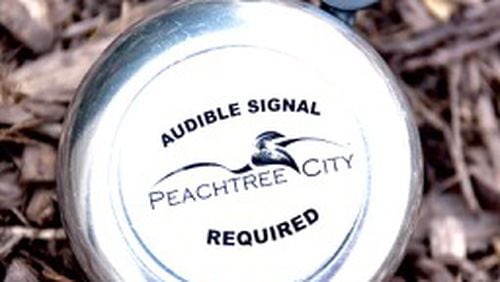With school letting out and summer weather beckoning, Peachtree City’s multi-use paths, streets and parking lots will be buzzing with golf carts. There are more than 10,000 registered gas- and electric-powered carts in the city, cruising through more than 100 miles of paths.
In January, the Peachtree City Police Department reported a 33 percent increase in cart-related accidents in 2016, mostly involving teenagers. Social media posts in Peachtree City often cite incidents in which (mostly young) golf cart drivers blow past pedestrians without slowing down. This can be especially hazardous for dog walkers if the animals are on longer, less visible retractable leashes.
The city’s updated brochure regarding golf cart use includes multiple safety warnings. Carts are not supposed to go more than 20 mph, and drivers are required to use a “horn or other audible signal” when approaching pedestrians from behind. Unlike pedestrians, golf carts do not have the right of way in crosswalks, paths or roads. Violators can be fined or face other consequences.
In February, city resident Susan Buekes approached the mayor, city manager and City Council asking that horns be made mandatory on all carts, saying that Title 40 of the Georgia Code requires horns on any personal transportation vehicle driven at night. City Manager Jon Rorie replied that the current ordinance requiring audible warnings is sufficient, and that horn use would be hard to enforce. The city is handing out free bicycle bells (that can also be used on carts) with a reminder sticker reading, “Audible Signal Required.”
Rorie said that horns alone cannot guarantee pedestrian safety, particularly if someone is using headphones or earbuds and can’t hear audible warnings. “Pedestrians also bear some of the responsibility for their safety on our paths,” he wrote Buekes. “Some common sense and sound judgment is also required.”
Peachtree City residents, are you concerned about safety on the paths? Is more regulation or better courtesy needed? Send us your thoughts at communitynews@ajc.com by Thursday for publication next Sunday.
LAST WEEK: SHOULD DECATUR CHANGE ELEMENTARY SCHOOL CONFIGURATION?
Decatur’s school board recently approved dividing its elementary grades into five K-2 buildings and two 3-5. The last time City Schools Decatur reconfigured its system was 2004, adopting the current K-3 and 4-5 model. Although that produced a pervasive hue and cry, ultimately the city’s classrooms were flooded, with K-12 enrollment more than doubling in the last 13 years.
In December the original facilities committee gave several reasons favoring reconfiguration: more collaboration between schools, an expansion of the International Baccalaureate program and more community involvement because of the extra year at 3-5.
Superintendent David Dude has said several time that he believes this “a more natural split. You have a balance where students spend three years at each elementary school. And there are natural curriculum changes where, for instance, in K-2 you learn to read, and starting in the third you read to learn.”
However, some may ask, “Why change what ain’t broke?”
Here’s what some readers had to say:
More traffic and headache for weary parents. — Brandice Abrams
This is how schools in Michigan are divided and it's a better more productive system. — Erika Martinez Nutter
Shouldn't the parents have some say in how their kids are taught? What is this based on? Just cost-savings? Or is it a real benefit to learning? I'd like to see some data before I sign off on this. — Concerned Citizen
With such a small school system, Decatur is one place where neighborhood schools should be the norm. I'm not sure that we should experiement on our children. What will we do if this doesn't work? — Ann Williams
Bill Banks for the AJC
About the Author






